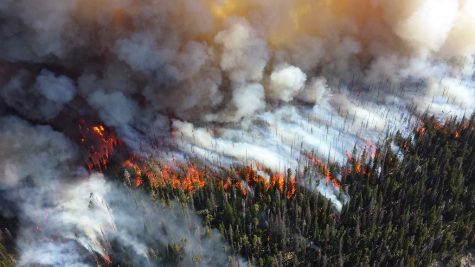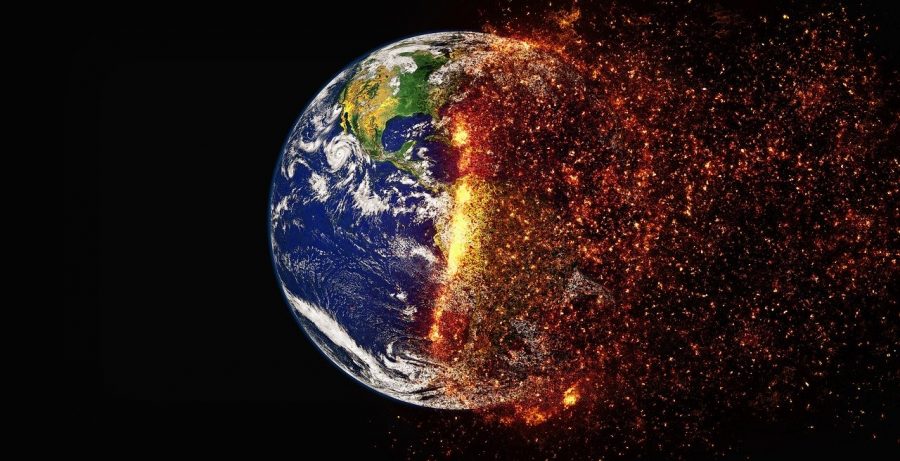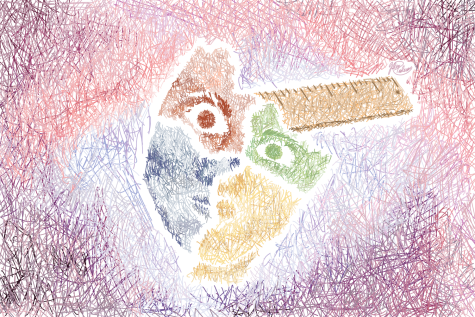Climate Change: Humanity’s Biggest Threat
In a pandemic stricken world, let’s not forget about the climate…
With the world’s climate changing, the future looks dire. If the Earth’s average temperature rises by another 2.7 degrees Fahrenheit or 1.5 degrees Celsius, the threshold for human safety will be passed. Live Science puts this in perspective: 15,000 years ago, during the last ice age, when the average temperature was lower by 9 degrees F, sea levels were 350 feet lower, 32% of the Earth was covered in ice. Small temperature shifts matter. If we don’t take drastic measures, the world will heat another 2.7 degrees Fahrenheit and life will never be the same. Basic necessities like food, water, and housing will be tremendously affected in addition to breathing safe air. Additionally biodiversity is in crisis; before the 22nd century we may well witness a sixth extinction. The World Counts summarizes human impact. If all of the Earth’s history was condensed into one year, human history would be the last 37 minutes. We humans have existed for a little over a half hour, but in just the last 0.2 seconds we’ve used 33% of the Earth’s natural resources. It’s time to stop denying and ignoring climate change. This is a crisis and we’re running out of time. We need to be in the streets protesting and striking, boycotting corporations that destroy our planet, dieting in a climate cautious way, and demanding climate justice and action from the government.
 It may be confusing to some why the climate crisis is such an extreme threat, but there is no question that it is. The World Counts has a live clock that shows that 556 billion tons of ice have already melted in 2020, and will reach at least 750 billion tons– a new normal. Annually, when 750 billion tons of ice melts, oceans receive 24,000 tons of melted water every second, or about 6,456,306 gallons each second. The World Counts puts that number into perspective as 10 olympic swimming pools being added 24-7, 365 days a year. The US Geological Survey (USGS) lays out a few more serious issues. Greenhouse gases get trapped in the atmosphere causing record world wide temperature rise. Droughts last longer, becoming more extreme and widespread. With warmer ocean water temperatures, tropical storms and hurricanes are more frequent and severe. Fires, likewise, are larger, longer, and more frequent. Drought combined with rising temperatures makes snow melt, severely weakening snow packs. Permafrost is melting, releasing Methane into the atmosphere. And in addition to rising, the ocean is acidifying. These changes and a bounty more suggest a wide range of problems that beg the question: Why are we sitting idly by as the Earth falls apart?
It may be confusing to some why the climate crisis is such an extreme threat, but there is no question that it is. The World Counts has a live clock that shows that 556 billion tons of ice have already melted in 2020, and will reach at least 750 billion tons– a new normal. Annually, when 750 billion tons of ice melts, oceans receive 24,000 tons of melted water every second, or about 6,456,306 gallons each second. The World Counts puts that number into perspective as 10 olympic swimming pools being added 24-7, 365 days a year. The US Geological Survey (USGS) lays out a few more serious issues. Greenhouse gases get trapped in the atmosphere causing record world wide temperature rise. Droughts last longer, becoming more extreme and widespread. With warmer ocean water temperatures, tropical storms and hurricanes are more frequent and severe. Fires, likewise, are larger, longer, and more frequent. Drought combined with rising temperatures makes snow melt, severely weakening snow packs. Permafrost is melting, releasing Methane into the atmosphere. And in addition to rising, the ocean is acidifying. These changes and a bounty more suggest a wide range of problems that beg the question: Why are we sitting idly by as the Earth falls apart?
As a result of all these changes, Earth’s biodiversity is at risk. The NY Times reports that as many as one million plant and animal species are at risk of extinction. A study concluded that there has been a little over a 20 percent decrease in the average abundance of native plant and animal life in the last century because of human impact. Activities such as farming, logging, poaching, fishing and mining take colossal tolls on ecosystems and creatures, and the effects of climate change will put many of these species over the edge. It is very possible, likely even, that the next generations will live without animals like tigers, elephants, and many more. Many may dismiss extinct species because it doesn’t affect their life if certain species no longer exist but that is selfish and ignorant. For one thing, nature offers a scientific balance on Earth, without certain creatures, ecosystems fall apart, which will affect us. Aside from the fact that nature is an essential part of human life, it’s hard for me to imagine a world where future generations, my future children, think of many of Earth’s animals the way we currently think of dinosaurs, extinct and non-existent images of the past never to be seen again.
Live Science gave a jaw dropping run down of how Earth may look by 2050 in the worst case scenario. If the world’s governments continue to ignore climate change and dismiss climate action, by 2050, there will be a global temperature increase of 5.4 degrees Fahrenheit or 3 degrees Celsius. At this point, Earth would fall out of control, the world’s ice sheets would disappear, and extreme drought would kill off huge percentages of tree and other plant life, including in the Amazon, the Earth’s lungs. Floods and wildfires would be prevalent, destroying the Earth’s terrain. At least a third of Earth’s land surface would become a desert. Coral reefs, rainforests, and ice sheets are among the many ecosystems that would collapse. Agricultural land would disappear and food shortages would follow. At least one billion people would become refugees, some as a result of their homes being drowned by sea level rise or flooding, others by burned homes, and many refugees forced to flee because of a complete lack of resources and necessities. With an influx of refugees and a lack of water and resource availability, the world’s superpowers such as the United States would likely be in competition. It is likely armed conflicts and war would ensue. There are certainly many hypotheticals of what could happen, and the time frame of 2050 may not necessarily be exactly on the dot, but it’s very clear if the climate is neglected and the Earth’s average temperature continues to inflate, utter chaos will break loose. Live Science’s predictions may be taken out of proportion or perceived as dramatic, but denying these possibilities is the same passive attitude that allowed us to be in the position we are today. If threats are not accounted for and seriously considered by us humans, a future as described by Live Science may not be far fetched.
There is no bigger threat facing human existence on Earth than the climate crisis. When so many people don’t believe this is a problem, and many who recognize the threats just don’t care, that is incredibly concerning. If humans don’t incorporate facts in their opinions on the climate, and continue refusing to take the steps to slow the crisis, there won’t be second chances. We’re on a pace to lose most of Earth’s biodiversity and put the human race in danger disproportionate to anything we’ve ever seen.
The Advocate welcomes well-considered opinion pieces from the community. Please submit to [email protected].







